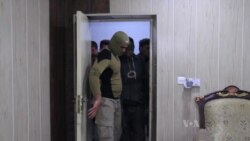Over the waning weeks of 2015, about 500 key Islamic State (IS) officials and commanders packed up and slipped away, leaving their posts in Syria and Iraq.
The move, according to a U.S. official familiar with the intelligence, was not part of any sort of retreat. Rather, it appeared to be a calculated move to bolster the self-declared caliphate’s growing provinces in Libya, already benefiting from a steady bleed-back of rank-and-file Tunisians and Libyans who honed their fighting skills in the terror group’s heartland.
While some U.S. officials see the militant group's Libya expansion as part of an effort to “buy time and space” in order to shift the world’s focus from losses in Iraq and Syria, the threat is being taken seriously.
A U.S. airstrike this past November targeted and killed Abu Nabil, believed to have been the top IS leader in Libya at the time.
And in remarks earlier this week during a visit to Paris to meet with coalition partners, U.S. Defense Secretary Ash Carter admitted, “Libya will continue to be a challenge in the year to come.”
Other current and former officials are even more wary, watching what they see as a force growing in size and in capability in a state already mired in chaos.
“It’s gas on the fire,” said Patrick Skinner, a former CIA case officer now with The Soufan Group, a strategic security intelligence consultancy. “Now you have the real nightmare because Libya’s not going to get any better any time soon.”
And it is a nightmare could look eerily familiar.
Growing force in Libya
“I would not be surprised if we woke up one morning, and ISIS in Libya had grabbed a large part of Libyan territory-the same kind of blitzkrieg on a smaller scale that we saw in Iraq,” former CIA deputy Director Michael Morell told lawmakers on the House Armed Services Committee earlier this month, using acronym to describe the terrorist organization, which also goes by ISIL and Daesh.
Part of the reason for that is how much IS's Libyan forces have grown, described by some as “exponential.”
A U.S. intelligence official, speaking on the condition of anonymity, put the number of IS fighters at “a few thousand,” though other Western and North African officials say the actual figure could be much higher, perhaps 5,000 or more.
“These assessments are still very fluid as numbers are likely to increase, especially in terms of foreigners,” said Jason Pack, a researcher of Middle Eastern History at Cambridge University and president of Libya-Analysis.com.
Already, evidence suggests IS in Libya has supplemented its veteran fighters from Syria and Iraq with new recruits from Tunisia, Mauritania, Sudan and Somalia.
And Pack believes the terror group is just starting to benefit from local support, something it has not yet enjoyed.
“In the last few months and weeks native Libyan participation in ISIS has increased notably, especially in sleeper cells in Tripoli,” he said. “Most of these Libyans are young under 30's and many under 20's, some of whom were suicide bombers in Benghazi and, most recently, in Sidra.”
Analysts believe that trend is only likely to accelerate if international efforts to broker a political settlement between the country’s warring factions falter or if some of those groups begin to succumb to internal differences.
The Soufan Group's Patrick Skinner calls it a remarkable turnaround for a group that, despite its brazen propaganda, had been straining to make a real impact on the ground.
“Last year ISIS was struggling,” he said. “They were just one of a thousand tiny militias in Libya.”
But despite a lack of the type of sectarian tensions that IS used to its advantage time and again in Iraq and Syria, the group has managed to take what was once just a training base and managed to turn it into something more substantial.
“Sirte, ISIS's stronghold in Libya, looks more and more like Raqqa, its Syrian equivalent: A city under foreign occupation,” according to Levantine Group security analyst Michael Horowitz.
“The local branches of ISIS have spared no efforts to promote Libya as a land for jihad,” he added.
Expanding reach
And as more and more jihadists land in Libya, the IS militants' reach expands.
“They have an increasing ability to project military power out of their base in Sirte and they have a safe haven space to organize, plan and recruit,” former U.S. Ambassador to Libya Robert Ford recently told U.S. lawmakers.
And Skinner, the former CIA case officer, worries that it will not take much for the growing Islamic State base in Libya to make its presence felt via familiar smuggling routes across the Mediterranean Sea.
“Instead of people having to go through Turkey and then cut across to Greece, they can now literally just hop on a boat and go 160 miles to Italy,” he said.
“People are going to get across that we don’t want to get across,” Skinner warned. “And if anybody thinks we’re monitoring that on a individual level, that is crazy.”






